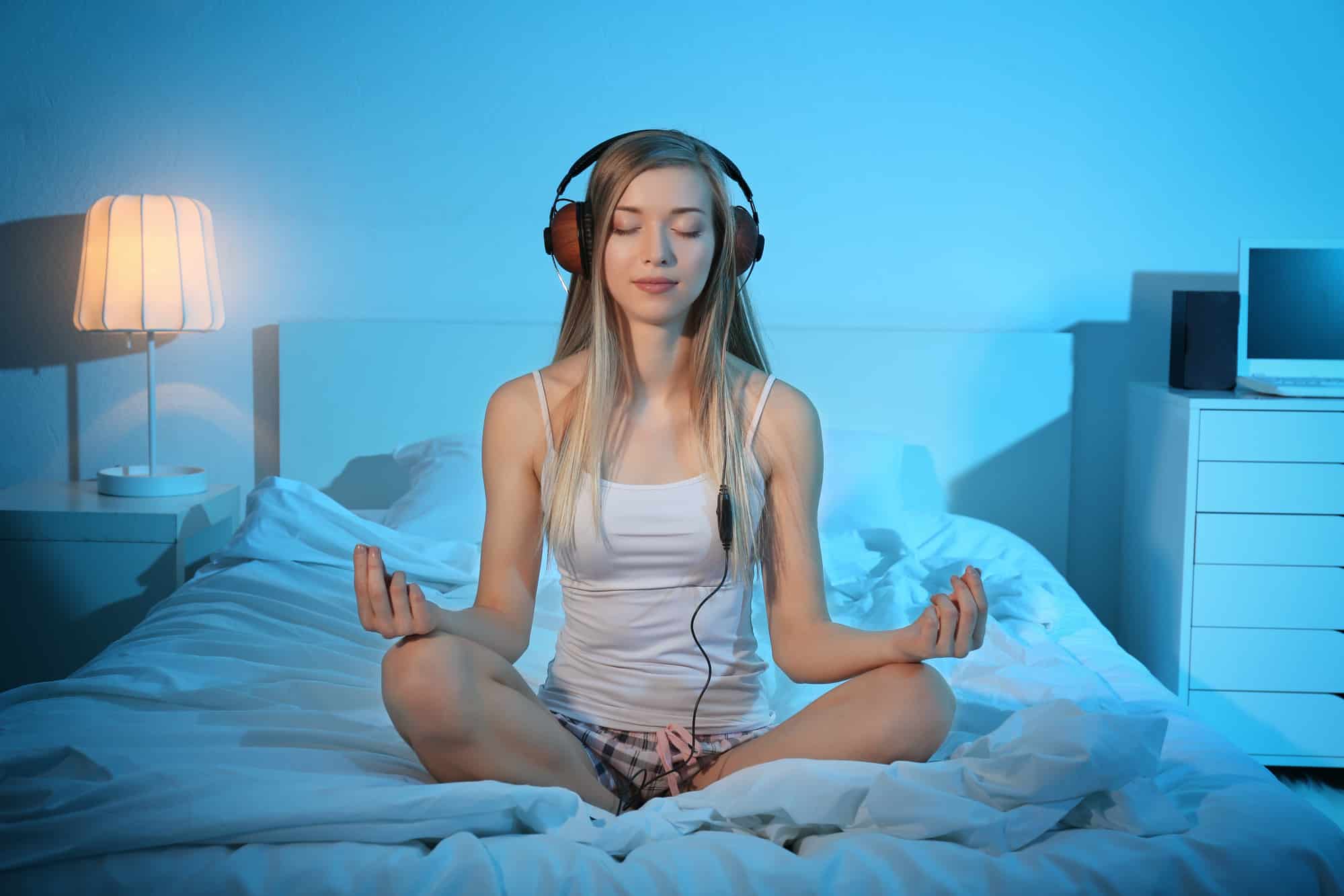Sleep is an essential aspect of our daily lives, contributing to our overall well-being and cognitive functioning. However, many individuals struggle with falling asleep or staying asleep throughout the night. One effective strategy for improving sleep quality is incorporating relaxing music into your bedtime routine. This article aims to provide a comprehensive guide on how to choose the best relaxing music for sleeping.
The benefits of relaxing music for sleep are widely recognized and supported by scientific research. It has been shown that listening to calming melodies before bed can promote relaxation, reduce anxiety, and help individuals achieve a deeper and more restful slumber. Understanding the effects of music on sleep quality is crucial in selecting the right type of music that suits your personal preferences and needs. Factors such as tempo, genre, and incorporation of nature sounds can significantly impact the effectiveness of sleep-inducing music. Moreover, utilizing music apps and streaming services provides a convenient platform for accessing a wide range of sleep-enhancing playlists tailored to individual preferences. By exploring different techniques such as binaural beats and ASMR (autonomous sensory meridian response), individuals can experiment with unique auditory experiences that may enhance their sleep even further. Overcoming common challenges in finding the best sleep music involves trial and error as well as understanding one’s own sensitivities towards certain sounds or genres. With these considerations in mind, integrating relaxing music into your bedtime routine can pave the way for improved sleep quality and overall well-being.
The Benefits of Relaxing Music for Sleep
The utilization of relaxing music for sleep has been associated with several benefits, including improved sleep quality, reduced stress levels, and enhanced overall well-being. Research has shown that listening to calming melodies before bedtime can have a positive impact on sleep. The soothing sounds help to create a peaceful environment, promoting relaxation and reducing anxiety or racing thoughts that may interfere with falling asleep. Additionally, the rhythm and melody of sleep music can synchronize with brainwaves, promoting a state of deep relaxation and facilitating the transition from wakefulness to sleep.
The science behind sleep music lies in its ability to activate the parasympathetic nervous system, which is responsible for promoting rest and relaxation. Studies have shown that listening to relaxing music before bed can lower heart rate and blood pressure, signaling the body’s physiological response to calmness. This not only helps individuals fall asleep faster but also improves the overall quality of their sleep. Moreover, soothing melodies can divert attention away from external stimuli or intrusive thoughts that may disrupt sleep onset or maintenance. By creating a pleasant auditory atmosphere, calming music provides a form of cognitive distraction that helps individuals relax their minds and disconnect from daily stressors. Ultimately, incorporating relaxing music into bedtime routines can contribute to better sleep outcomes and an improved sense of well-being.
Understanding the Effects of Music on Sleep Quality

Understanding the impact of music on sleep quality involves exploring its various effects and how it influences the overall sleeping experience. One significant effect of music on sleep is its ability to influence dreaming. Research has shown that listening to relaxing music before sleep can increase dream recall and enhance the emotional content of dreams. This suggests that music has the power to stimulate certain brain regions associated with dreaming processes, leading to more vivid and emotionally intense dreams. However, it is important to note that not all individuals may experience this effect, as dream recall and intensity can vary from person to person.
In addition to its effects on dreaming, music also plays a role in managing sleep disorders. For individuals suffering from insomnia or other sleep disorders, listening to calming music before bedtime can promote relaxation and ease the transition into sleep. Music has been found to reduce anxiety levels and decrease heart rate, contributing to a more peaceful state conducive for falling asleep. Furthermore, incorporating relaxing melodies or white noise into a nightly routine can help create a soothing environment that signals the body to wind down and prepare for restful sleep. Overall, understanding the effects of music on sleep quality allows us to harness its potential benefits in promoting better sleep and managing sleep disorders effectively.
Choosing the Right Tempo for Relaxation
Exploring the impact of tempo on relaxation, one can delve into the potential emotional response it may evoke during the sleep experience. When choosing the right rhythm for relaxation, it is important to consider how different tempos can affect our physiological and psychological state. Research suggests that slower tempos have a calming effect on the body and mind, promoting a sense of tranquility and aiding in sleep induction. Slower rhythms are believed to lower heart rate and blood pressure, inducing a state of deep relaxation conducive to falling asleep faster and experiencing better overall sleep quality.
In addition to choosing the right tempo, incorporating soothing melodies can further enhance the relaxing qualities of music for sleep. Melodies with simple structures and smooth contours are often found to be more relaxing as they reduce cognitive load and promote ease of listening. Soft instrumentals or nature sounds like gentle rain or waves crashing on a beach have been particularly effective in creating a peaceful atmosphere for sleep. By selecting music with these characteristics, individuals can create an optimal auditory environment that supports relaxation and ultimately leads to improved sleep outcomes.
Exploring Different Genres for Sleep Music
Different genres of music offer unique qualities that can enhance the sleep experience. When exploring instrumental music for sleep, it is important to consider the calming effect it has on the mind and body. Instrumental music often lacks lyrics, allowing listeners to focus solely on the soothing melodies and rhythms without being distracted by words. This type of music can help create a peaceful atmosphere conducive to relaxation and sleep. Additionally, instrumental music can have a slower tempo which promotes a sense of tranquility and helps slow down brain activity, making it easier to fall asleep.
Another genre worth exploring for sleep music is ambient sounds. These are recordings that mimic natural noises such as rain falling, waves crashing, or birds singing. Ambient sounds have been found to be particularly effective in creating a calm and serene environment for bedtime relaxation. The gentle nature of these sounds can help drown out background noise or unwanted distractions, promoting better sleep quality. Moreover, ambient sounds can also act as white noise, which can mask other disruptive noises in the environment and help induce sleep by providing a constant sound that is soothing and predictable.
When choosing relaxing music for sleeping, considering different genres such as instrumental music and ambient sounds can greatly contribute to creating an optimal sleep environment. These genres offer unique qualities that promote tranquility and calmness necessary for achieving restful sleep. Whether it is the absence of lyrics in instrumental music or the soothing nature of ambient sounds, both options provide excellent choices for enhancing the sleep experience.
Incorporating Nature Sounds for a Tranquil Sleep Environment
Incorporating nature sounds into the sleep environment has been shown to create a tranquil atmosphere conducive to restful sleep. Nature inspired sleep sounds, such as the gentle rustling of leaves, flowing water, or chirping birds, can help calm the mind and relax the body. These natural sounds have a soothing effect on the nervous system and can mask background noises that may disrupt sleep. By incorporating ambient sounds for better sleep, individuals can create a serene and peaceful environment that promotes relaxation and enhances their overall sleep quality.
Research has demonstrated the positive effects of nature sounds on sleep. A study published in the journal Environmental Research found that participants who listened to natural sounds before bedtime experienced improved sleep quality compared to those who did not listen to any sound or listened to artificial noise. The rhythmic patterns and harmonious tones of nature sounds have been found to induce a state of relaxation by activating the parasympathetic nervous system, which is responsible for promoting rest and restoration. Furthermore, incorporating nature-inspired sleep sounds into the bedroom environment can also help drown out disruptive noises from outside sources, such as traffic or neighbors, creating a more peaceful sleeping environment.
Incorporating nature sounds into the sleep environment has proven benefits in promoting a tranquil atmosphere for restful sleep. By integrating nature-inspired ambient sounds into one’s bedroom routine, individuals can create an optimal setting for relaxation and enhance their overall sleep quality. Whether it is through recordings of gentle waves crashing on a beach or soft raindrops falling on leaves, these soothing natural melodies have been shown to calm the mind and promote deep slumber.
Creating a Personalized Sleep Playlist

Crafting a personalized sleep playlist can enhance the sleep experience by curating a collection of carefully selected sounds that resonate with individual preferences, fostering a deep sense of relaxation and tranquility. The benefits of sleep music are well-documented, as it has been shown to promote better sleep quality, reduce stress levels, and improve overall well-being. By creating a personalized sleep playlist, individuals can choose specific songs or sounds that evoke a sense of calmness and comfort, allowing them to drift off more easily into a restful slumber.
One of the main advantages of using a personalized sleep playlist is the ability to cater to individual preferences. Everyone has different tastes in music and sounds that they find soothing, so having the freedom to select specific tracks allows for a more tailored experience. Some individuals may prefer classical music or instrumental melodies, while others may find nature sounds like rain or ocean waves more relaxing. By curating a playlist that aligns with one’s personal preferences, it becomes easier to create an environment conducive to restful sleep.
Moreover, research has shown that listening to relaxing music before bedtime can have numerous benefits for sleep quality. It can help slow down heart rate and breathing patterns, lower blood pressure, and reduce muscle tension – all essential factors in achieving deep relaxation necessary for falling asleep. Additionally, incorporating familiar songs or favorite tracks into the playlist can evoke positive emotions and nostalgia which further contributes to feelings of comfort and ease. Overall, crafting a personalized sleep playlist not only enhances the sleeping experience but also provides an opportunity for self-expression through sound selection while reaping the many benefits associated with sleep music.
Utilizing Music Apps and Streaming Services for Sleep
Utilizing music apps and streaming services provides individuals with a convenient platform to access a wide range of audio content specifically designed to promote relaxation and facilitate better sleep. These platforms offer various genres of music therapy, including ambient, classical, and instrumental tracks that are known to induce feelings of calmness and tranquility. Additionally, many music apps and streaming services provide curated playlists tailored for sleep meditation, which combine soothing melodies with soft nature sounds or white noise to create an optimal environment for restful sleep.
Music therapy has been widely studied as a non-pharmacological intervention for improving sleep quality. Research suggests that listening to relaxing music before bedtime can reduce the time it takes to fall asleep, decrease the number of awakenings during the night, and improve overall sleep efficiency. By utilizing music apps and streaming services, individuals can easily integrate music therapy into their nightly routine without the need for specialized equipment or professional guidance. Moreover, these platforms often offer customizable features such as adjustable volume levels and timer settings, allowing users to personalize their listening experience according to their preferences.
Music apps and streaming services offer a convenient way for individuals to access a variety of audio content aimed at promoting relaxation and enhancing sleep quality. Through the availability of specific genres like ambient or classical tracks as well as curated playlists for sleep meditation, these platforms cater to different preferences in order to create an optimal environment for restful sleep. By incorporating music therapy into their nightly routine with the help of these digital tools, individuals can potentially experience improved sleep outcomes without relying on medication or other interventions.
Experimenting with Binaural Beats and ASMR for Sleep Enhancement
Utilizing music apps and streaming services for sleep has become increasingly popular in recent years. However, for those seeking an even deeper level of relaxation and sleep enhancement, experimenting with binaural beats and ASMR can be worth exploring. Binaural beats are a form of auditory illusion created by playing two slightly different frequencies in each ear. This technique is believed to synchronize brainwaves and induce a state of deep relaxation or even meditation.
Research on the effects of binaural beats for sleep enhancement is still limited but shows promising results. A study published in the Journal of the Medical Association of Thailand found that participants who listened to binaural beats for just 30 minutes before bedtime experienced significant improvements in subjective sleep quality compared to those who did not listen to any specific audio stimulation. Another study published in PLOS ONE reported that binaural beat stimulation led to an increase in slow-wave activity, which is associated with deep sleep, as measured by electroencephalography (EEG).
When experimenting with binaural beats for sleep, it is important to find the right volume that promotes relaxation without causing disturbances during the night. It is recommended to start at a low volume and gradually increase if needed while monitoring how it affects your sleep quality. Additionally, individual preferences may vary, so what works for one person may not work for another. Exploring different frequencies and types of binaural beats can also help find the most effective option for enhancing your sleeping experience.
Tips for Using Relaxing Music in Your Bedtime Routine
Incorporating calming melodies into your nighttime routine can significantly enhance the quality of your sleep. When it comes to using relaxing music for sleeping, there are several tips that can help you make the most out of this practice. Firstly, it is important to choose music with a slow tempo and minimal lyrics, as these elements can promote relaxation and minimize mental stimulation. Instrumental tracks or nature sounds have been found to be particularly effective in inducing sleep. Additionally, creating a consistent bedtime routine that includes listening to relaxing music can signal to your body that it is time to wind down and prepare for sleep.
Another tip for incorporating music into your bedtime routine is to use a timer or playlist that gradually fades out the volume as you drift off to sleep. This gradual decrease in sound can prevent sudden awakenings during the night and allow for a more uninterrupted slumber. Furthermore, consider experimenting with different genres or styles of music until you find what works best for you personally. Some individuals may find classical music soothing, while others may prefer ambient or electronic compositions.
Moreover, research has shown that incorporating relaxing music into your bedtime routine can not only improve sleep quality but also impact dream experiences. Music has been found to influence dream content by creating emotional contexts and stimulating memories within dreams. Listening to pleasant tunes before bed can evoke positive emotions during dreaming and potentially lead to more pleasant dream scenarios overall.
Overall, incorporating calming melodies into your nighttime routine through relaxing music can have numerous benefits on both the quality of your sleep and dream experiences. By following these tips and finding what works best for you personally, you can create a soothing atmosphere that promotes optimal restfulness throughout the night.
Overcoming Common Challenges in Finding the Best Sleep Music
One common challenge faced by individuals seeking to enhance their sleep through music is finding the most effective selection that aligns with their personal preferences and promotes relaxation. When it comes to overcoming distractions, it is important to choose music that is soothing and calming, without any sudden changes or jarring sounds. This can help create a peaceful environment conducive to sleep. Additionally, individuals may find it helpful to select music without lyrics or with minimal vocals, as this can minimize potential distractions and allow for a more immersive experience.
Another challenge in finding the best sleep music is determining the ideal volume. While some individuals may prefer soft and gentle melodies, others may find comfort in slightly louder sounds. It is essential to strike a balance between not being too loud or too soft, as excessive noise can disrupt sleep while overly quiet tunes might fail to mask background noises effectively. Experimenting with different volume levels and gradually adjusting them based on personal preference can be beneficial in finding the perfect balance for a restful night’s sleep.
Overall, finding the most suitable relaxing music for sleeping involves overcoming distractions by selecting soothing sounds without sudden changes or distracting lyrics. Additionally, determining the ideal volume plays a crucial role in creating an environment conducive to deep relaxation and uninterrupted sleep. By taking these factors into consideration and experimenting with different options, individuals can overcome these challenges and find the best sleep music that meets their needs for enhanced restfulness at night.
Conclusion
In conclusion, choosing the best relaxing music for sleeping can greatly enhance the quality of our sleep and promote a sense of tranquility and relaxation. The benefits of soothing music have been widely acknowledged, with research showing its positive effects on sleep patterns and overall well-being. By understanding the impact of music tempo, exploring different genres, incorporating nature sounds, utilizing music apps and streaming services, experimenting with binaural beats and ASMR, and incorporating relaxing music into our bedtime routine, we can overcome common challenges in finding the best sleep music.
It is important to note that individual preferences may vary when it comes to selecting sleep music. What works for one person may not necessarily work for another. Therefore, it is crucial to experiment with different types of relaxing music to find what resonates with us personally. Additionally, creating a peaceful sleep environment by eliminating distractions and practicing good sleep hygiene can further enhance the effectiveness of sleep-inducing music. Overall, by incorporating these strategies into our bedtime routine, we can optimize our chances of achieving a restful night’s sleep through the power of soothing melodies.


